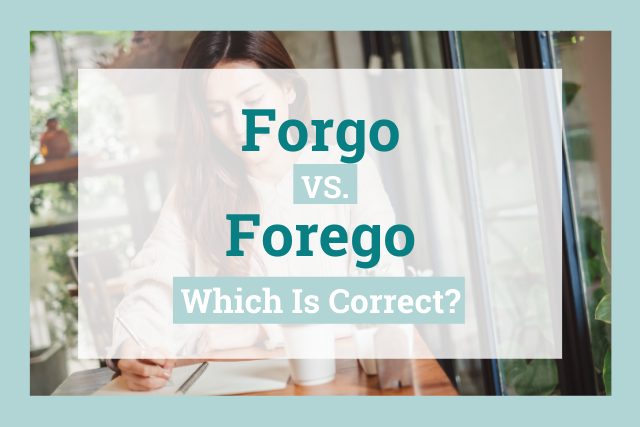
The words forgo and forego are very similar but they do have different meanings.
Forego means to go before and forgo means to go without. As a result, work tends to forego a holiday but nobody wants to forgo a holiday.
Forego is also a variant spelling of forgo.
What Does Forgo Mean?
Forgo is a verb that means to go without or refrain from something desirable.
Here are some examples of “forgo” in every-day sentences.

- It may be best to forgo sweets to protect your teeth.
- Until the afternoon, I will forgo being outside because I don’t want to get sunburnt.
- Dylan decided to forgo watching the hockey match in favor of going for a walk.
- Many children decide to forgo wearing coats.
Forgo has a number of synonyms that can help to keep your writing interesting:
- Forfeit
- Forsake
- Refrain (from)
- Waive
- Relinquish
- Renounce

You can also use these synonyms to check that you are using “forgo” correctly; simply swap “forgo” with a synonym to see if your sentence still makes sense.
Correct: I think we should forgo (forfeit) a day out to save for our holiday.
The word forfeit makes perfect sense in this sentence.
Incorrect: Missing fun events must forgo (relinquish) going on holiday.
In this example, forego (meaning to come before) is the correct word to use.
What Does Forego Mean?
Forego means to come before in time or place and it can function as a verb or an adjective.

To demonstrate this, here are some examples of “forego” in sentences:
- David Attenborough’s reputation foregoes him.
- Completing a college degree usually foregoes a person becoming a teacher.
- A safety demonstration will forego this ride.
- The foregoing contributors helped us to bring this text to you.
Some synonyms of “forego” are:
- Precede
- Forerun
- Come before
- Herald

As with forgo synonyms, it is possible to check your usage of forego simply by substituting it for one of these synonyms.
Correct: A high school diploma in math must forego (come before) a person taking a college degree in math.
This sentence logically explains that someone must have passed math in the 12th grade to undertake math in university.
Incorrect: You must forego (precede) going out with your friends in order to pass our math exam.
This synonym does not make sense and therefore we can see that forgo (forsake) is the right word.
Forego Through the Centuries
Over time, forego and forgo have been treated more like alternative spellings of each other rather than separate words.
To demonstrate this progressive change, here are some quotes that include “forego” from different centuries.
Seventeenth century: “By our remembrances of days foregone, / Such were our faults, or then we thought them none.” William Shakespeare, All’s Well that Ends Well
In this quote, foregone means before, which aligns with the separate definitions provided in this article.

Eighteenth century: “‘Oh, you know, deuce take it,’ said this gentleman, looking round the board with an imbecile smile, ‘we can’t forego Blood, you know. We must have Blood, you know.’” Charles Dickens, David Copperfield
As early as the 18th century, forego was used as an alternative spelling for forgo, as in this quote where it means forsake.
Nineteenth century: “I requested my young lady to forego her ramble, because I was certain of showers.” Emily Brontë, Wuthering Heights
In this line, forego means forfeit and is a misspelling of forgo.
Twentieth century: “From the foregoing account it will be seen that in Newspeak the expression of unorthodox opinions, above a very low level, was well-nigh impossible.” George Orwell, 1984
George Orwell demonstrates here that the distinction between words was still present in the last century because forego is synonymous with preceding.
Are Forgo and Forego Interchangeable?
Although many people use forego and forgo interchangeably, and have for centuries, the two words traditionally have different definitions.
Many dictionaries list forego as a variant spelling of forgo so you would not be penalized for using one in place of the other. When used interchangeably, forgo without an “e” is generally the favored spelling.
However, now that you know the difference, I would suggest that you use forgo when your intended meaning is “go without,” and forego when you mean “go before.”
Remember the Difference Between Forgo vs. Forego
There is an easy way to remember the difference between forgo and forego and it all lies in the additional “e.”
The prefix fore means to be situated or placed in front (think before). So if you want to say that something precedes something else, use forego with the “e.”
If you mean that something desirable should be forfeited, use forgo without the “e.”


